May 04, 2017
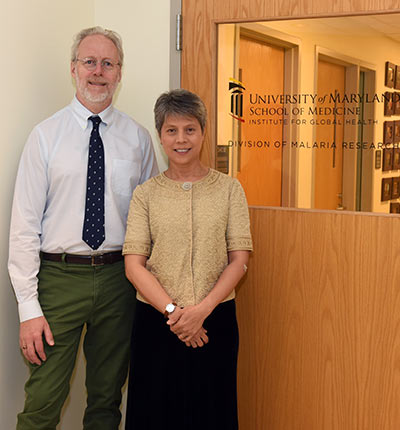
UM SOM Institute for Global Health Scientists Will Focus on Understanding Drug-Resistant Malaria in Southeast Asia
The University of Maryland School of Medicine has been awarded an International Center of Excellence for Malaria Research (ICEMR) grant by the National Institutes of Health’s National Institute of Allergy and Infectious Diseases (NIAID), one of seven ICEMRs awarded worldwide. With funding of more than $9 million over seven years, the grant will be used to research and develop new tools to help eliminate drug-resistant malaria in Myanmar and neighboring countries in Southeast Asia.
Principal investigators for the project are the husband-and-wife team of Christopher Plowe, MD, MPH, the Frank M. Calla MD Professor of Medicine and Founding Director of the Institute for Global Health (IGH), University of Maryland School of Medicine (UM SOM), and Myaing Myaing Nyunt, MD, MPH, PhD, Assistant Professor of Medicine and Director of IGH Myanmar in the Division of Malaria Research (DMR) at the IGH.
“The initial strategy was to try to contain drug-resistant malaria and prevent it from spreading, but our research will help us move forward toward completely eliminating malaria from this region,” said Dr. Plowe.
Despite significant progress in reducing malaria incidence and mortality, the World Health Organization estimates that roughly 212 million new cases of malaria and 429,000 malaria deaths occurred in 2015 alone. In addition, drug-resistant cases are on the rise. The emergence of multi-drug resistant malaria parasites in Southeast Asia is especially concerning to public health officials, who fear it may spread worldwide, resulting in untreatable malaria.
At sites in central Myanmar and on both sides of its borders with China and Bangladesh, the new Myanmar Regional Center of Excellence for Malaria Research will integrate findings from clinical and field research, including molecular surveillance, genomics, and geospatial mapping and modeling of malaria risk, to provide essential knowledge, tools, and evidence-based strategies to stratify malaria risk, with the ultimate aim of accelerating malaria elimination in the region.
IGH has already conducted genetic studies to track the emergence and spread of resistance to artemisinins, the first line drugs used to treat malaria worldwide. They have also developed highly sensitive diagnostic tests for low-level malaria infections that serve as a reservoir, causing no symptoms in infected people. “We think these ‘silent’ infections may be a critical source of ongoing malaria transmission that are missed by standard tests and interventions,” said Dr. Nyunt, who is originally from Myanmar.
The grant number is 1U19AI129386-01.
“The spread of drug-resistant malaria is a growing public health problem in many parts of the world, and our research will help eradicate this disease, building upon our long legacy of advancing research in developing countries,” said UM SOM Dean E. Albert Reece, MD, PhD, MBA, who is also Vice President for Medical Affairs at the University of Maryland and the John Z. and Akiko K. Bowers Distinguished Professor. “Research conducted through our Institute for Global Health has already helped save many lives, and this generous grant from NIAID will allow our scientists -- working with national and international partners -- to continue their important work of making malaria a disease of the past."
About the Institute of Global Health
The IGH, established in 2015 at the University of Maryland School of Medicine, is dedicated to improving global health by conducting innovative, world-leading research in Baltimore and around the world. Led by Founding Director Christopher Plowe, MD, MPH, FASTMH, the institute develops new and improved ways of diagnosing, preventing, treating, controlling, and eradicating diseases of global impact. Currently, these diseases include malaria, Ebola, and vaccine-preventable infectious diseases such as measles.
About the University of Maryland School of Medicine
Celebrating its 210th Anniversary, the University Of Maryland School Of Medicine was chartered in 1807 and is the first public medical school in the United States and continues today as an innovative leader in accelerating innovation and discovery in medicine. The School of Medicine is the founding school of the University of Maryland and is an integral part of the 11-campus University System of Maryland. Located on the University of Maryland’s Baltimore campus, the School of Medicine works closely with the University of Maryland Medical Center and Medical System to provide a research-intensive, academic and clinically based education. With 43 academic departments, centers and institutes and a faculty of more than 3,000 physicians and research scientists plus more than $400 million in extramural funding, the School is regarded as one of the leading biomedical research institutions in the U.S. with top-tier faculty and programs in cancer, brain science, surgery and transplantation, trauma and emergency medicine, vaccine development and human genomics, among other centers of excellence. The School is not only concerned with the health of the citizens of Maryland and the nation, but also has a global presence, with research and treatment facilities in more than 35 countries around the world. medschool.umaryland.edu/
Learn More
• Institute for Global Health (IGH)
• National Institute of Allergy and Infectious Diseases (NIAID)
• Division of Malaria Research
• Institute for Global Health (IGH)
• Center for Vaccine Development (CVD)
Contact
Office of Public Affairs
655 West Baltimore Street
Bressler Research Building 14-002
Baltimore, Maryland 21201-1559
Contact Media Relations
(410) 706-5260
Related stories

Friday, October 17, 2025
New Monoclonal Antibody Shows Promise for Preventing Malaria Infections
Malaria remains one of the leading causes of death among children in sub-Saharan Africa, claiming more than 600,000 lives each year worldwide with limited efficacy in currently available treatments and vaccines. Now a new early-stage clinical trial found that a novel monoclonal antibody provided dose-dependent full protection against the malaria parasite with minimal side effects.
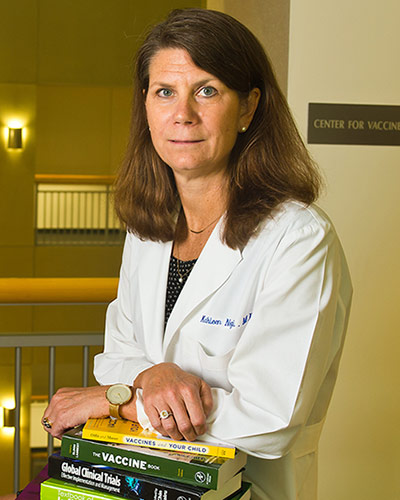
Wednesday, April 05, 2023
UM School of Medicine Researchers Chart Path Forward on Developing mRNA Vaccines for Infections Beyond COVID-19
After helping to develop and test new mRNA technologies for COVID-19 vaccines, University of Maryland School of Medicine (UMSOM) researchers and scientists are turning their attention to utilizing this innovative technology to ward off other infectious diseases like malaria and influenza. Last month, UMSOM faculty in the Center for Vaccine Development and Global Health (CVD) launched a new clinical trial to investigate the use of mRNA technologies to create a vaccine against malaria. CVD Director Kathleen M. Neuzil, MD, MPH, FIDSA also provided commentary in the nation’s leading medical journal on the feasibility of using mRNA to develop a universal influenza vaccine that could eliminate the need for seasonal shots.
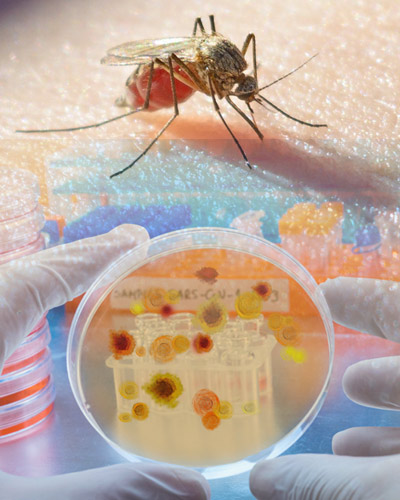
Thursday, December 22, 2022
A Three-Dose Malaria Vaccine Shows Safety, Efficacy in West African Adults
A three-dose regimen of a whole-parasite vaccine against malaria – called Plasmodium falciparum sporozoite (PfSPZ) vaccine – demonstrated safety and efficacy when tested in adults living in Burkina Faso, West Africa, which has endemic malaria. That is the finding of a new study published Dec. 7 in Science Translational Medicine. Researchers at the University of Maryland School of Medicine’s Center for Vaccine Development and Global Health (CVD) led the work.

Monday, July 18, 2022
New Genomic Research Shows Why Testing Malaria Vaccines in the Clinic is as Rigorous as Natural Exposure in the Field
Malaria is the deadliest mosquito-borne parasitic infection of humans. In 2021, after a century of research, the World Health Organization (WHO) approved the world’s first malaria vaccine. That vaccine reduces the incidence of malaria infections in young children aged 5-17 months by only 30 percent, meaning that it remains critical to continue developing and testing more effective vaccines.

Tuesday, November 02, 2021
Unexpected Antibody Type Found in People with Malaria Infections
Malaria, a pathogen transmitted into blood by mosquitoes in tropical climates, is typically thought of as a blood and liver infection. However, in a newly published study, researchers at the University of Maryland School of Medicine (UMSOM) have detected antibodies primarily made in response to infections in the mucous membranes — in such areas as the lungs, intestines, or vagina — in study participants with malaria.

Sunday, October 28, 2018
American Society of Tropical Medicine & Hygiene Awards Dr. Miriam Laufer the LePrince Medal for Malaria Research
Miriam Laufer, MD, MPH, Professor of Pediatrics and Associate Director for Malaria Research at the University of Maryland School of Medicine’s (UMSOM) Center for Vaccine Development and Global Health (CVD), was awarded the Joseph Augustin LePrince Medal by the American Society of Tropical Medicine and Hygiene (ASTMH).
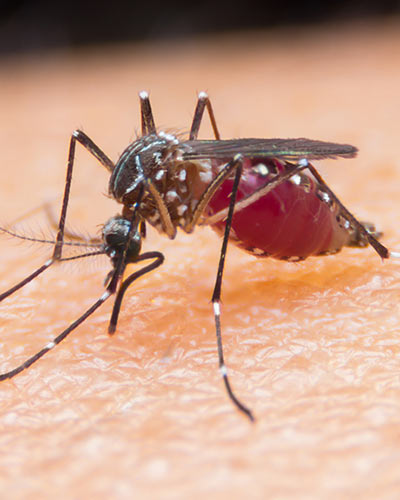
Friday, February 24, 2017
Experimental Malaria Vaccine Provides Durable Protection Against Multiple Strains in NIH Clinical Trial
An experimental malaria vaccine protected healthy subjects from infection with a malaria strain different from that contained in the vaccine, according to a study published this week in the Proceedings of the National Academy of Sciences (PNAS). The research was conducted by scientists at the University of Maryland School of Medicine and the National Institute of Allergy and Infectious Diseases (NIAID), part of the National Institutes of Health (NIH).

Thursday, September 22, 2016
University of Maryland School of Medicine Holds Inaugural Global Health Summit
The Institute for Global Health (IGH) at the University of Maryland School of Medicine (UM SOM) will hold its first Global Health Summit on September 26. The event, which will take place from noon to 6 p.m. in the SMC Campus Center at 621 W. Lombard Street, will seek to foster collaboration among scientists and promote new and innovative global health research at UM SOM, as well as at other schools at the University of Maryland, Baltimore (UMB). Faculty and staff from UM SOM, as well as other schools are welcome at the event.
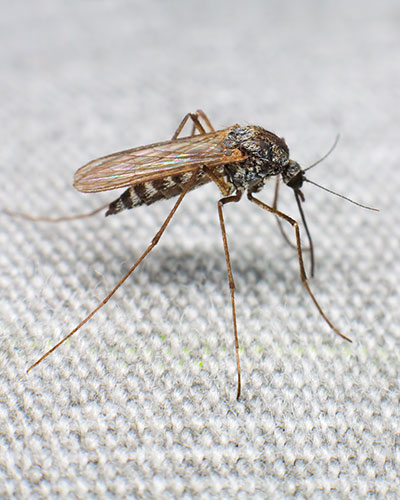
Wednesday, July 06, 2016
UMSOM Begins Malaria Vaccine Trial in Burkina Faso
Malaria is one of the world’s deadliest diseases: it infects hundreds of millions of people every year, and kills about half a million, most of them under five years of age.
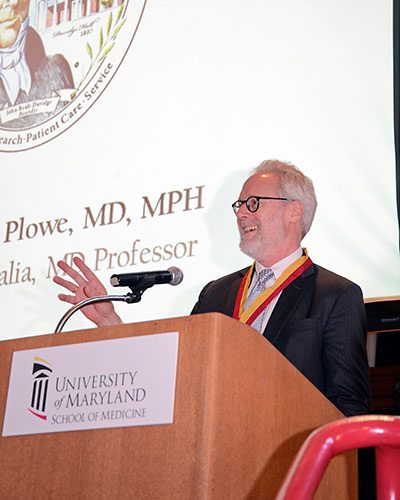
Friday, June 24, 2016
Investiture Celebrates the Courage and Passion of Two University Warriors
In a packed Westminster Hall, with one of the largest audiences to date for any investiture ceremony, Christopher Plowe, MD, MPH, was named the Frank M. Calia, MD Professor of Medicine.

Tuesday, April 12, 2016
UM SOM Researcher Dr. Kathleen Neuzil Honored by Vanderbilt University School of Medicine
The Vanderbilt University School of Medicine (VUSM) has announced that Kathleen Neuzil, MD, MPH, director of the Center for Vaccine Development at the University of Maryland School of Medicine (UM SOM), has received the 2016 Vanderbilt University School of Medicine Distinguished Alumni Award.
